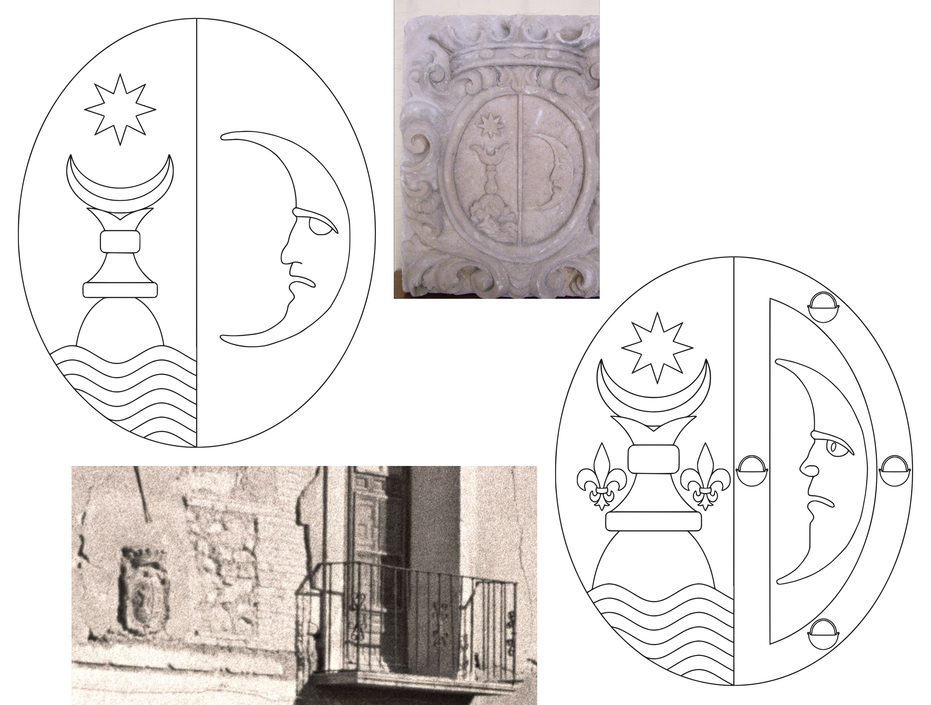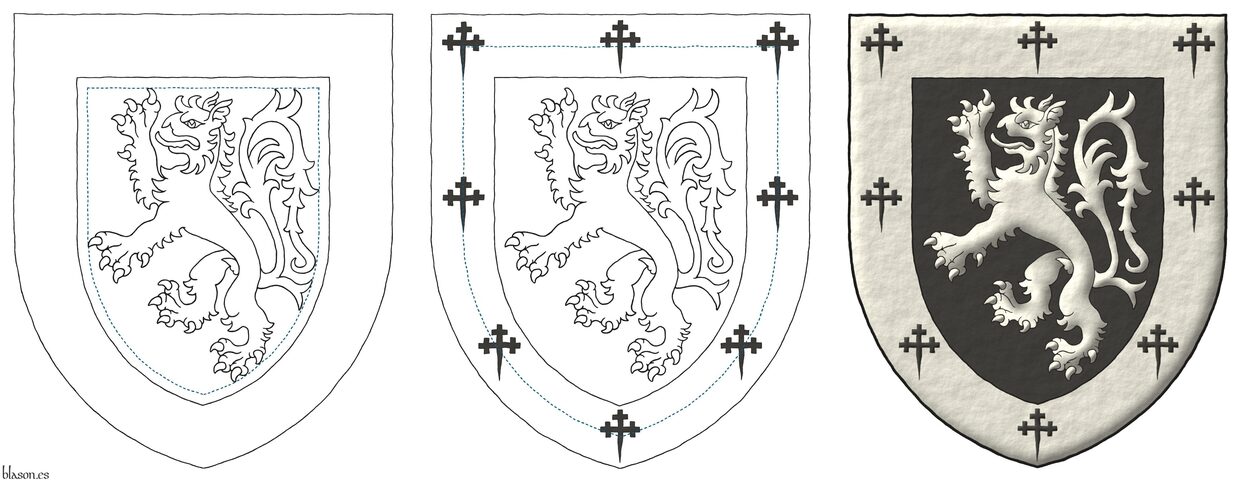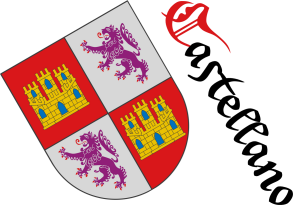
Gangoiti, lineage
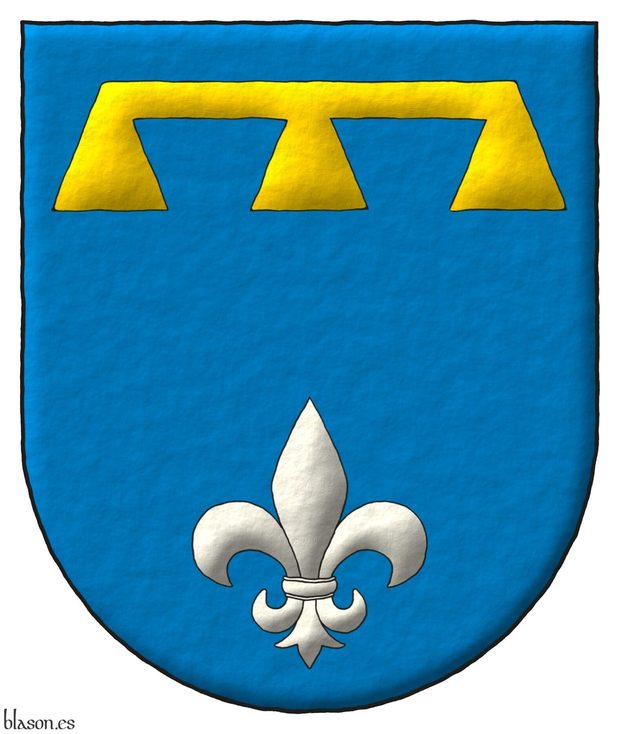
Azure, in chief a label Or, and in base a fleur de lis Argent.
Escudo de azur, en jefe un lambel de oro y en punta una flor de lis de plata.
Coat of arms painted by me, illuminated with lights and shadows, contoured in Sable, with a semi-circular outer contour and with a freehand finishing.
Coat of arms of the lineage Gangoiti emblazoned by me based on the description by [Cadenas y Vicent, V. de; 1987; page 770].
Blazon keywords: Azure, Or, Argent, One, In chief, Label, In base and Fleur de lis.
Style keywords: Outlined in sable, Illuminated, Semi-circular and Freehand.
Classification: Personal, Lineage, Interpreted, Boa and Coat of arms.
Bearer: Gangoiti, lineage.


Osona, lineage
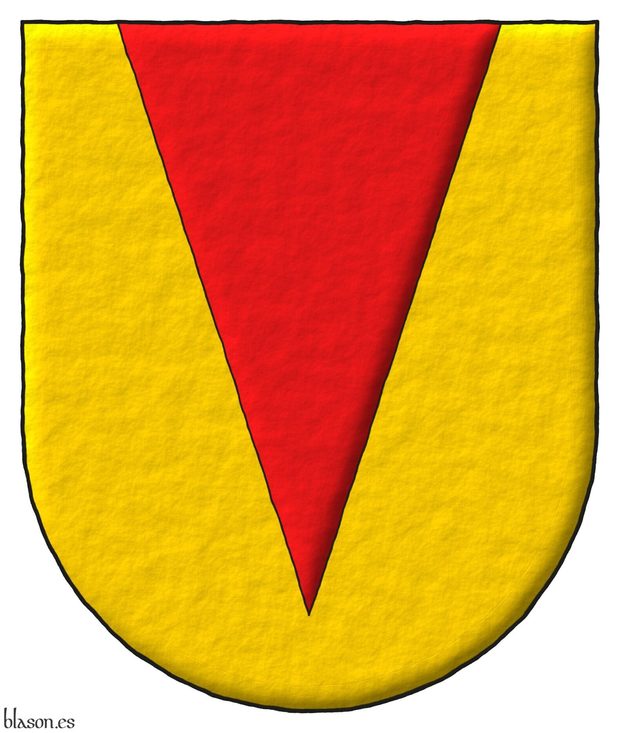
Or, a pile Gules.
Escudo de oro, una pila de gules.
Coat of arms emblazoned by me, illuminated with lights and shadows, contoured in Sable, with a semi-circular external shape and with a freehand finishing.
Coat of arms of the lineage Osona emblazoned by me based on the description by [Cadenas y Vicent, V. de; 1987; page 1325].
Blazon keywords: Or, Gules, One and Pile.
Style keywords: Outlined in sable, Illuminated, Semi-circular and Freehand.
Classification: Personal, Lineage, Interpreted, Boa and Coat of arms.
Bearer: Osona, lineage.


The Armorial Register, 2024
International Register of Arms, The Armorial Register.
During the year 2024, the owners of three coats of arms I have designed and painted have registered them at The Armorial Register - International Register of Arms, located at Regent Villa, England, a prestigious register of arms run by Martin S. J. Goldstraw.
In the image, the arms of Kane Kathleen of Ireland, Darryn Carlo and Roberto Luchoro of Australia and Spain, and Rui Jorge Vaz of the United States painted by me and registered by the Armorial Register.
Categories: Armorial roll and Doctor.
Root: The Armorial Register.


Rui Jorge Vaz, The Armorial Register
Registered by The International Register of Arms, 16th December 2024, Registration number 0712, Volume 4.
Category: Armorial roll.
External link:
Root: The Armorial Register.


Featured heraldic artist, The Armorial Register
Dr. Antonio Salmerón, featured heraldic artist in The Armorial Register
It is an honor to be featured among the heraldic artists in The Armorial Register, sharing the spotlight with distinguished peers. My heraldic artwork is now displayed on the page dedicated to «Featured Heraldic Artists», reflecting years of dedication and passion for heraldry. Thank you, Martin S. J. Goldstraw, for this recognition and the opportunity to share my creations with a global audience.
Categories: Armorial roll and Doctor.
External links:
Root: The Armorial Register.


The Administration House of the Pious Foundations of Cardinal Belluga y Moncada
Conference by Francisco Domingo Larrosa Gil, «The Administration House of the Pious Foundations of Cardinal Belluga y Moncada in the Town o f Dolores», sponsored by the University of Alicante, Archbishop Loazes Chair, Orihuela University Venue, coordinated by Dr. Gregorio Canales Martínez, Academic Coordinator of the Chair.
The main objective of the conference was to analyze and identify the coats of arms present on the façade of the former Administration House of the Pious Foundations of Cardinal Belluga y Moncada, located in the town of Dolores, Alicante. Through a historical and heraldic approach, the evolution of the property and changes in its ownership were detailed. Initially, the arms of the first Count of Pinohermoso, Juan Nepomuceno Mariano Roca de Togores y Escorcia, 1752–1794, who acquired the building after its disentailment, were identified. His coat of arms, featuring the cross of the Order of Malta, confirms his connection to this order as a Knight of the Sovereign Military and Hospitaller Order of St. John of Jerusalem, Rhodes, and Malta. This emblem does not appear in subsequent armorial bearings of holders of this title, securing its identification as belonging to the building's first noble owner. The transition of the property from its original association with Cardinal Belluga y Moncada to the House of the Marquisate of Rafal was then highlighted, possibly acquired by Antonia María de Heredia y Rocamora, 8th Marchioness of Rafal, or her son, Vicente Melo de Portugal y Heredia, 9th Marquis of Rafal, between the late 18th and early 19th centuries. Subsequently, the property was sold in 1927 to a merchant known as Don Juan del Arroz and, finally, demolished in 1960.
In the image, two photos of armorial stones from the Roca-Togores lineage and two delineations made by me, extracted from these armorial stones, which were presented during the conference.


Lord of South Clifton, schema 1x3
Sable, a tyger rampant Argent; a bordure Argent charged with eight crosses crosslet fitchy Sable.
Coat of arms of the Lord of South Clifton emblazoned by me in 3 steps, showing how the tyger is placed within the bordure, and the crosses crosslet fitchy are arranged on it.
Blazon keywords: Sable, Argent, One, Eight, Tyger, Rampant, Bordure, Charged and Cross crosslet fitchy.
Style keywords: Outlined, Outlined in sable, Illuminated and Pointed.
Classification: Personal, Interpreted, Schema, Boa and Coat of arms.
Bearer: South Clifton, Lord of.


South Clifton, Lord of
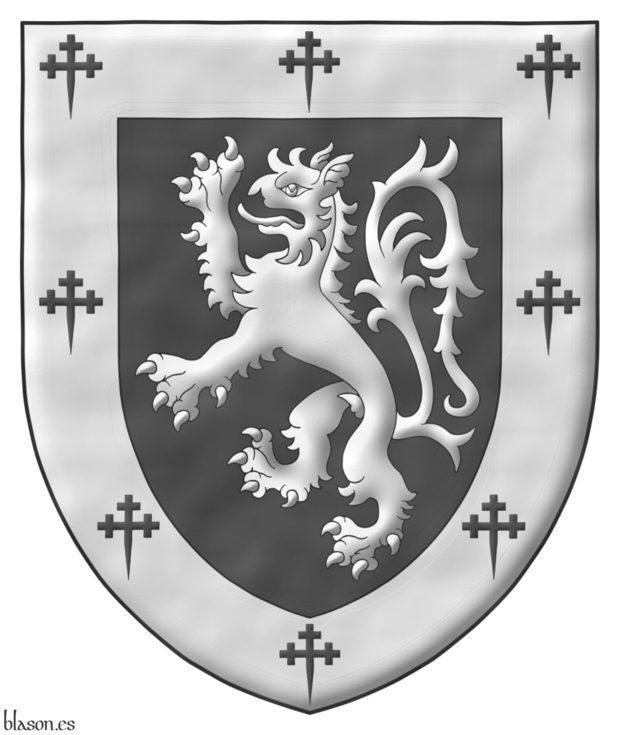
Sable, a tyger rampant Argent; a bordure Argent charged with eight crosses crosslet fitchy Sable.
Escudo de sable, un tigre heráldico rampante de plata; una bordura de plata cargada de ocho cruces recrucetadas, fijadas de sable.
Arms depicted by me, illuminated with lights and shadows, outlined in Sable, with a pointed external shape and with a watercolor finishing.
Coat of arms of the Lord of South Clifton emblazoned by me. In heraldry, there are two types of tigers with specific names in both English and Castilian: the «tyger» in English I call «tigre heráldico» in Castilian, and the «tiger» in English I refer to as «tigre» in Castilian, omitting the Bengal qualifier that some authors use for the natural tiger. According to [Fox-Davies, A. C.; 1909; page 191, figures 322-325], the differences between these two representations are significant. The «tyger», or «tigre heráldico», is a fantastical animal, created from the imagination of medieval artists who were unfamiliar with the real animal but knew of its existence through distant descriptions. This heraldic tyger has a body resembling that of the natural tiger, but with a mane like that of a lion, a tufted tail, and a peculiar head that looks more like a wolf than a natural tiger. Additionally, it lacks the characteristic stripes of the Bengal tiger. Recall that the heraldic panther is also an example of a fantastical animal, breathing fire from its nose and ears and covered in colorful spots. On the other hand, the natural «tiger», identified as the «Bengal tiger» by [Fox-Davies, A. C.; 1909; page 191, figures 324-325], appears in heraldry later and is a more realistic depiction of the animal as it exists in nature.
Blazon keywords: Sable, Argent, One, Eight, Tyger, Rampant, Bordure, Charged and Cross crosslet fitchy.
Style keywords: Outlined in sable, Illuminated, Pointed and Watercolor.
Classification: Personal, Interpreted, Boa and Coat of arms.
Bearer: South Clifton, Lord of.

Continue with: Lord of South Clifton.
-
Language
-
Categories of heraldry
-
Divisions of the field
- Without divisions
- Party per pale
- Party per fess
- Party per bend
- Party per bend sinister
- Tierce
- Tierce sinister
- Tierced per pale
- Tierced per fess
- Tierced per bend
- Tierced pallwise inverted
- Quarterly
- Quarterly per saltire
- Gyronny
- Party per fess, the chief per pale
- Party per pale, the sinister per fess
- Party per fess, the base per pale
- Party per pale, the dexter per fess
- Chapé
- Chaussé
- Embrassé
- Contre-embrassé
- Party per chevron
- Enté
- Enté en point
- Flanched
-
Metals
-
Colours
-
Furs
-
Other tinctures
-
Ordinaries and sub-ordinaries
-
Diminutives of the ordinaries
-
Geometric charges
-
Composite ordinaries
-
Inanimate charges from Nature
Atom, Crescent, Diamond, Emerald, Estoile, Increscent, Lightning flash, Moon, Mount, Mullet, Mullet of four points, Orbital, Plough of Ursa Major, Rainbow, Ray of the sun, River, Sea, Snowflake, Sun, Sun in splendour, Sun of May, Terrestrial globe, Trimount, Water and Wave.
-
Vegetal charges from Nature
Acorn, Apple, Apple tree, Ash, Bluebonnet, Camellia, Chrysanthemum, Cinquefoil, Cornflower, Dogwood flower, Double rose, Eguzki-lore, Elm, Fleur de lis, Flower, Gourd, Holm oak, Hop cone, Indian paintbrush, Kapok tree, Laurel, Lily, Linden, Lotus flower, Madonna lily, Mexican cedar tree, Oak, Olive tree, Palm tree, Plantain plant, Pomegranate, Poplar leaf, Rose, Shamrock, Sunflower, Thistle, Tree, Tulip, Vine and Wheat.
-
Animal charges from Nature
Badger, Bald eagle, Barbel, Barn owl, Bear, Beaver, Bee, Beetle, Bighorn sheep, Binson, Blackbird, Boar, Brach hound, Bull, Cow, Doe, Dog, Dolphin, Dove, Eagle, Elephant, Falcon, Female figure, Fish, Flame, Fly, Fox, Frog, Goat, Goldfinch, Goose, Heron, Horse, Hummingbird, Jaguar, Lark, Leopard, Lion, Lion passant, Lion rampant guardant, Lioness, Lynx, Male figure, Martlet, Merino ram, Owl, Panther, Parrot, Peacock, Pelican, Pelican in her piety, Pronghorn, Puffin, Quetzal, Raven, Roe deer, Rooster, Savage, Seagull, Serpent, She-wolf, Stag, Starling, Talbot, Turtle, Tyger, Vulture, Warren hound and Wolf.
-
Parts of natural charges
Arm, Beak, Branch, Caboshed, Chest, Claw, Covert, Dorsal fin, Eagle claw, Ear of wheat, Ermine spot, Escallop, Feather, Foot (palmiped), Foreleg, Forepaw, Hand, Head, Heart, Hoof, Leaf, Neck, Ostrich feather, Palm frond, Paw, Roe deers' attires, Shoulder, Sprig, Stags' attires, Stem, Swallow-tail, Tail, Tail addorsed, Tail fin, Talon, Tibia, Tooth, Trunk, Trunk (elephant), Two hands clasped, Two wings in vol, Udder, Wing and Wrist.
-
Artificial charges
Ace of spades, Anchor, Anvil, Arch, Arm vambraced, Armillary sphere, Arrow, Axe, Bell, Bell tower, Beret, Bonfire, Book, Bookmark, Bow, Branding iron, Bridge, Broken, Buckle, Cannon, Cannon dismounted, Cannon port, Canopy roof, Carbuncle, Castle, Celtic Trinity knot, Chain, Chess rooks, Church, Clarion, Clay pot, Closed book, Club, Column, Comb, Compass rose, Conductor's baton, Cord, Covered cup, Crozier, Crucible, Cuffed, Cup, Cyclamor, Dagger, Displayed scroll, Double vajra, Drum, Ecclesiastical cap, Fanon, Federschwert, Fleam, Four crescents joined millsailwise, Galician granary, Garb, Gauntlet, Geometric solid, Grenade, Halberd, Hammer, Harp, Host, Hourglass, Key, Key ward, Knight, Knot, Lantern, Letter, Line, Loincloth, Maunch, Menorah, Millrind, Millstone, Millwheel, Monstrance, Mortar, Mullet of six points pierced, Nail, Non-classic artifact, Norman ship, Number, Oar, Oil lamp, Open book, Page, Pair of pliers, Pair of scales, Parchment, Pestle, Piano, Pilgrim's staff, Plough share, Polish winged hussar, Port, Portcullis, Potent, Quill, Ribbon, Rosette of acanthus leaves, Sabre, Sackbut, Sail, Scroll, Scythe, Sheaf of tobacco, Ship, Skirt, Spear, Spear's head, Stairway, Star of David, Step, Sword, Symbol, Tetrahedron, Torch, Tower, Trident, Trumpet, Turret, Two-handed sword, Wagon-wheel, Water-bouget, Wheel, Winnowing fan and With a turret.
-
Immaterial charges
Angel, Archangel, Basilisk, Dragon, Dragon's head, Garuda, Golden fleece, Griffin, Heart enflamed, Justice, Mermaid, Our Lady of Mercy, Ouroboros, Paschal lamb, Pegasus, Phoenix, Sacred Heart of Jesus, Saint George, Sea-griffin, Sea-lion, Trinity, Triton, Unicorn, Winged hand and Wyvern.
-
External elements
-
Heraldic creations
-
References
-
Formats
-
Keywords on this page
Watercolor, Pointed, Armorial roll, Azure, Boa, Bordure, Charged, Cross crosslet fitchy, Outlined, Outlined in sable, Doubled, Doctor, In chief, In base, Coat of arms, Schema, Scroll, Fleur de lis, Gangoiti, lineage, Personal, Gules, Illuminated, Interpreted, Label, Motto, Lineage, Semi-circular, Eight, Or, Osona, lineage, Pile, Argent, Rampant, Sable, South Clifton, Lord of, The Armorial Register, Tyger, Freehand and One.




